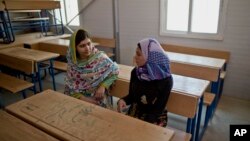Rich countries should spend less on weapons in the Syrian civil war and more on education, Nobel Peace Prize laureate Malala Yousafzai said Monday, calling world leaders "quite stingy'' as she toured a camp for the conflict's refugees.
Malala, a champion for girls' education rights, was joined in Azraq camp by Mezon al-Melihan, a 17-year-old refugee who has been urging girls to stay in school. Malala and Mezon, an Azraq resident, walked hand-in-hand through the camp, made up of rows of white, prefabricated shelters that's home to close to 20,000 refugees. The teens spoke to school girls, played on a swing set and kicked around a soccer ball.
Since the 2011 outbreak of Syria's conflict, more than 4 million Syrians have fled their country, most settling in neighboring countries such as Jordan. Aid agencies asked for $4.5 billion for 2015 to help refugees, but have been forced to slash support programs because of large funding gaps. Studies have indicated that growing numbers of refugee children are working to help support their desperate families. Early marriage among refugee girls also is on the rise.
Malala, who rose to fame after being shot by the Taliban in her native Pakistan in 2012 for insisting on her right to education, said the world must do more to help the refugees.
"There are rich countries in this world, there are world leaders who can afford spending money on weapons, who can afford spending money on the war that is going on in Syria,'' she said in a speech at the Azraq community center. She said these countries and leaders have been "quite stingy'' when it comes to spending on education and that shifting resources to schools is "the only way we can achieve success.''
"This is why we are here to ask world leaders to treat the rest of the world's children as their own children,'' she added.
She later told The Associated Press that she has been inspired by education rights campaigners such as Mezon, whom she first met last year ago in Zaatari, another camp in Jordan. In December, Mezon attended the Nobel ceremony in Oslo at Malala's invitation.
Syrian refugee children face many challenges, Malala said in an interview. "Many young girls they get married at a very young age, boys — their parents send them for child labor'' because the adults can't find work, she said.
Malala, who lives with her family in Birmingham in Britain, celebrated her 18th birthday on Sunday while opening a school for Syrian refugees in Lebanon.
Asked about her plans for the future, now that she is an adult, Malala said: "I want to get more familiar with British culture and live there for a few years, so I think for a bachelor's [degree] I should stay at Oxford and for a master's I should go to another country.''
She said her activism keeps her busy and that "I don't have time




